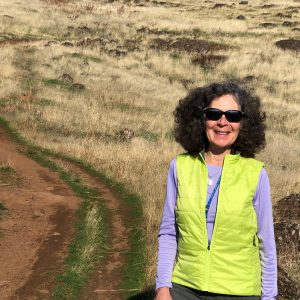Marcy J. knows firsthand that dealing with hearing loss is no easy feat. Lasting over 30 years, her hearing journey was a long and windy one, which eventually isolated her from the things she loves most—lectures, readings and other activities she enjoyed prior to her hearing loss. Once she found the Cochlear™ Nucleus® Cochlear Implant System, she was on her way back, learning to hear again and rediscovering life. The most important thing she learned was to advocate for herself and others with hearing loss, ensuring they were set up for success. Read what Marcy has done in her own community to stand up for herself and others:
Many of us have had to forcefully advocate for ourselves during our hearing journey: Dealing with hearing loss and its impact on our lives, years of hearing aids with diminishing returns, obtaining a cochlear implant and relearning how to hear with our implants. Once we have the surgery and are on our way to better hearing, I think it is important to create awareness in the organizations in which we participate, and not just with hearing-related organizations and events.
I am 71 and retired from a demanding career that included urban planning, historic renovation and commercial development, economic development and creating industry-academia partnerships. I consider myself to be a lifelong learner, as well as being very active as a road biker, hiker, and more recently, a birdwatcher. I am active in several environmental organizations, including the Audubon Society of Portland.

Hearing ups and downs
I began to lose my hearing periodically in my late 40’s, at first only in my left ear. I remember coming home from a bicycle tour and putting my phone to my left ear to call a friend only to find that I could not hear. When my hearing tests confirmed the loss, I was terrified. But to my surprise, my hearing returned a few weeks later. This pattern continued through the years and began to occur in my right ear as well. The loss was especially dramatic after a couple of unrelated surgeries. By then I had started with a series of hearing aids, since my hearing never returned to its previous levels, and remained worse on the left side. Even with MRIs and other testing, none of the very smart specialists I saw could figure out the cause of my hearing loss or a remedy. I was given several generic names for the condition, such as Fragile Inner Ear Syndrome and an Autoimmune Inner Ear Disease.
Over time, my hearing got much worse and began to affect my activities and social life. When my audiologist told me there was nothing more she could do, I became severely depressed and stopped socializing as much. Eventually, I was tested for a cochlear implant. At first, I did not quite qualify under Medicare’s higher standard, but finally, I met the criteria in both ears.
I got my cochlear implant in my left ear (my worse ear) at the age of 70. The surgery and recovery went very smoothly, with no major side effects. The minimal residual hearing in the left ear was retained. Upon activation, my auditory system clicked in fairly rapidly, and I have been satisfied with the results. A second surgery may be in the not too distant future.
A return to activities
Though I had never stopped any of my outdoor activities, I gradually began to return to lectures, readings and other activities which I had enjoyed for many years prior to severe hearing loss. Always, I tried to check out the rooms in advance, sit up front where I could see the speakers, experiment with the programs on my processor and use my remotes.
Gradually, I began making suggestions, asking if the group had mics or specialized equipment. This has been especially true at Audubon Society of Portland, where I not only travel on some of the birding and ecology tours but attend lectures or classes on a monthly basis. If it was not too awkward, I would ask a speaker if he or she would wear my Cochlear™ True Wireless™ Mini Microphone during the presentation and Q&A sessions afterward. When I had a chance, I would talk to the organizers or Executive Director, explaining that they probably could expand their participation if they paid more attention to acoustics and providing support for hearing-impaired members and supporters (or future members and supporters) who probably don’t show up due to hearing frustrations.

Persistence and advocacy
Finally, some of my persistence has paid off. I know that I am not the only member at Audubon with moderate to severe hearing loss. After the last Nature Night presentation of the season, I spoke with the Audubon Executive Director about hearing issues and learned that the organization is looking into purchasing some equipment. I also suggested that presentation slides in classes or Nature Night lectures be captioned. I followed up with an e-mail to the Executive Director later that week, suggesting resources and offering to test any equipment they might consider.
About a week later, I received an e-mail back from the Executive Director, thanking me and indicating they are committed to making this happen. The organization is very interested in extending their reach. So, I think the motto ‘Nevertheless, She Persisted’ shall rule the day.
(PS: It probably helped that I contributed to Audubon’s Wildlife Care Center this year via my IRA).
If you feel like your hearing aids are no longer enough, visit Cochlear.com/US/CochlearImplants.
To learn more about insurance coverage for hearing implants, visit Cochlear.com/US/Insurance.
If you are a cochlear implant recipient and would like to volunteer at events in your area, visit Cochlear.com/US/Events.